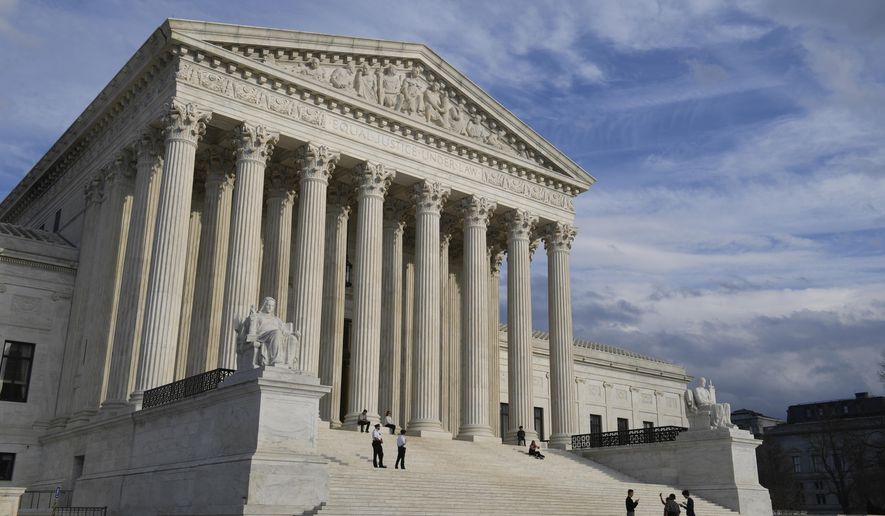April Woodard, a child abuse investigator, figured something was wrong with the 4-year-old girl who showed up at her Colorado school with bumps, cuts and bruises.
With the permission of her supervisor — but no notice to the child’s mother, nor to any judges — Ms. Woodard, a case worker at the El Paso County Department of Human Services, performed a strip search to look for signs of abuse.
Now the Supreme Court is being asked to decide whether those suspicions were valid enough to justify the search. The justices will consider whether to take the case at a conference Thursday.
If the high court agrees to hear the appeal, it could be the first time the justices settle the dispute over what type of Fourth Amendment standard should apply to case workers involved in child abuse investigations.
“It’s a very complicated area and it really brings out conflict between different bodies of laws or different social goods,” said Mary Leary, a professor at the Catholic University of America.
The mother and daughter, who remain anonymous in court documents, argue in their appeal that Ms. Woodard could have examined the girl without disrobing her and discovered the allegations had no merit.
Government and school officials did not disclose to the mother, a disabled veteran, that the strip search had been performed, but she later found out when her daughter said she felt uncomfortable.
They want the high court to require a warrant before strip searching children without parental consent.
And they suggested the court could revisit its doctrine of qualified immunity, which protects government employees who tread on someone’s rights from being successfully sued when they are deemed to have been acting in their official capacity on behalf of the government.
The 10th Circuit ruled against the girl on qualified immunity grounds.
According to court documents, the 2014 search traumatized the child to the point where the young girl was “angry and upset” and “talked frequently about it.” She ended up leaving the school where the incident took place.
The family’s case has drawn support from a broad coalition, which includes the libertarian right and the civil liberties left.
Jay Schweikert, an attorney with the libertarian Cato Institute, said his organization wants to see the courts revisit the qualified immunity doctrine, saying it has been used to shield government actors from too much bad behavior.
He said sitting members of the Supreme Court, including Justice Clarence Thomas and Justice Sonia Sotomayor have questioned how the doctrine has played out.
“Several members of the court have been calling for a reconsideration of qualified immunity,” he said. “Those justices, too, are quite diverse.”
Lower courts have split on the question of warrants.
The 2nd, 3rd, 5th and 9th Circuit Courts of Appeal have all said a warrant is required for a caseworker to perform a search. The 4th and 7th Circuits ruled no warrant is needed. Those circuits apply the “special needs balancing test,” saying normal Fourth Amendment practices are surmounted by the special circumstances.
That sort of circuit split is often an enticement for the justices to take a case.
Kermit Roosevelt, a law professor at the University of Pennsylvania, said the justices granted a similar case years ago, though the Fourth Amendment question was never resolved and the fact there is a circuit split are powerful points in the girl’s favor.
“On the surface it looks like a compelling petition with a relatively high likelihood of being granted,” he said.
Ms. Leary said the conflict between investigating allegations of child abuse and the criminal law factors that can arise from the results of a probe produce a “thorny issue.”
“If we remember that the vast majority of child abuse cases involve someone in the household, you can see how that would make perfect sense for someone investigating child abuse … not being in the presence of the guardian,” Ms. Leary said.
Colorado officials say the justices can duck the big issues by ruling that Ms. Woodard is immune from the lawsuit because she was acting in her official capacity.
“The court’s qualified immunity jurisprudence has been developed over the course of more than 50 years,” their attorneys argued, saying the appeal “presents no compelling reason for the court to revisit its principles concerning qualified immunity.”
If the Supreme Court takes the case, the justices likely will hear it during the court’s 2020 term.
• Alex Swoyer can be reached at aswoyer@washingtontimes.com.




Please read our comment policy before commenting.